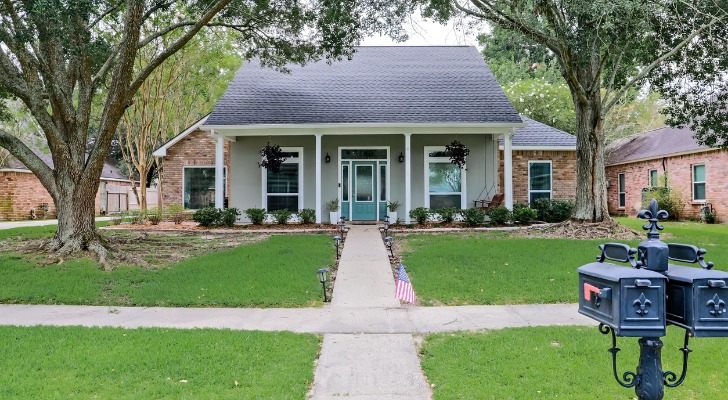

Not every potential homebuyer can afford the traditional 20% down payment. In fact, many Americans struggle to pull together enough finances for a substantial down payment on a mortgage. However, that doesn’t mean your dream home is out of reach. When that happens, potential buyers can still purchase their property with the help of mortgage insurance. Mortgage insurance is one of the ways lenders protect themselves from potential loss. And while it’s a common cost, it doesn’t last forever. Consider consulting a financial advisor on how to make sure your mortgage doesn’t disrupt your financial plan.
Mortgage insurance is a type of insurance policy that protects the lender against default on home loans. Since private mortgage insurance (PMI) lowers this risk, it allows people to buy homes with down payments smaller than the traditional 20%.
Generally, conventional lenders require homebuyers who put down less than 20% to purchase PMI. The buyer then pays a regular monthly premium each month along with the mortgage payment.
However, mortgage insurance doesn’t just apply to conventional loans. Borrowers of Federal Housing Administration (FHA) and United States Department of Agriculture (USDA) loans also have to pay a form of mortgage insurance.
The cost of PMI varies among lenders and depends on factors such as loan amount, your credit score, your loan-to-value ratio (LTV) and the terms of the loan.
Based on the Urban Institute’s data, the average range for PMI rates is 0.5% to 1.86% of the loan’s original amount. Assuming a PMI insurance rate of 0.51%, Freddie Mac estimates that homebuyers pay around $30 to $70 each month per $100,000 borrowed.
But, again, this depends on your situation. For example, Urban Institute bases the above percentages on a $275,000 home with a 96.5% loan-to-value (LTV) ratio. Likewise, your LTV ratio will impact your insurance rates. The smaller the percentage, the less risk your lender takes on, thus affording you more favorable rates.
In the same vein, your credit score also plays a crucial factor in the cost. Urban Institute estimates that a homebuyer with a score above 760 pays around $1,241 per month (based on the above assumptions). In comparison, someone with a score between 620 to 639 pays $363 more.
It may be impossible to avoid mortgage insurance when you first buy your home. However, you’re not stuck with it forever. There are four ways you can ditch PMI:

PMI is attached to conventional loans, which are not backed by any government program. But they do meet requirements, as a “conforming” loan, to be sold by Freddie Mac or Fannie Mae. On the other hand, homebuyers who borrow an FHA loan pay mortgage insurance premiums (MIP). FHA loans, unlike their conventional counterparts, are backed by the government through the Federal Housing Administration. Borrowers of FHA loans must pay MIP, regardless of their down payment amount.
As mentioned above, PMI only comes into play if you can’t pay a down payment minimum of 20%. But this isn’t the only financial difference between the two types of mortgage insurance. They also require different upfront and annual costs.
You generally pay PMI as an annual premium on a monthly installment basis. You have the option to pay a one-time lump sum at closing, avoiding the annual costs, but it’s not necessary. In contrast, FHA loans require a UFMIP, or an upfront mortgage insurance premium, worth 1.75% of the loan total in addition to the annual MIP. Borrowers either pay this once at closing or integrated into the loan amount.
Along with that, borrowers of FHA loans have annual MIP costs between 0.45% to 1.05%, according to Experian. But PMI annual costs usually range from 0.58% to 1.86%, according to Urban Institute.
Lastly, their differences come down to cancellation policies. Whereas you can cancel PMI once you meet certain equity or loan requirements, MIP can’t be avoided unless you made a substantial down payment.
Mortgage insurance isn’t something homebuyers really opt for. Rather, it’s something they may face when they obtain either a conventional or FHA loan. So, the better question to ask is: which loan type is right for your financial situation, and what can you afford to put as a down payment.
Conventional loans are usually a good choice for borrowers with stronger credit scores or those who can make a substantial down payment, even if they can’t hit the 20% marker. But conventional loans may also work well for anyone trying to pay as little down payment as possible. Compared to the FHA’s minimum of 3.5%, conventional loans allow a payment as low as 3%.
In contrast, FHA loans might be the better option for borrowers with a weak credit score or multiple, larger debts.
Additionally, remember that you can research loans outside the above two options. For example, you might be looking for a home in a more rural location. In that case, you may want to consider a USDA loan, which targets low- to middle-income earning borrowers in those areas. They offer no down payment requirements at the cost of a guarantee fee (a form of mortgage insurance). This typically includes an upfront fee worth 1% of the total loan amount and a yearly fee of 0.35%.
Veterans and eligible homebuyers should also look into a VA loan. It also offers 0% down, but without the requirement of mortgage insurance.

Homeowners should keep in mind that the Homeowners Protection Act, or the PMI Cancellation Act, protects them from excessive PMI charges. As a result, you don’t have to suffer the additional costs of PMI forever. So, even if you face the temporary expense in addition to your regular mortgage installments, you can work toward dropping the extra cost. If you can manage to save enough for a down payment, you may not even have to concern yourself with mortgage insurance.
Photo credit: ©iStock.com/Edwin Tan, ©iStock.com/designer491, ©iStock.com/ucpage
Ashley KilroyAshley Kilroy is an experienced financial writer currently serving as an investment and insurance expert at SmartAsset. In addition to being a contributing writer at SmartAsset, she writes for solo entrepreneurs as well as for Fortune 500 companies. Ashley is a finance graduate of the University of Cincinnati. When she isn’t helping people understand their finances, you may find Ashley cage diving with great whites or on safari in South Africa.
Read More About Mortgage



More from SmartAsset
SmartAsset Advisors, LLC ("SmartAsset"), a wholly owned subsidiary of Financial Insight Technology, is registered with the U.S. Securities and Exchange Commission as an investment adviser. SmartAsset's services are limited to referring users to third party advisers registered or chartered as fiduciaries ("Adviser(s)") with a regulatory body in the United States that have elected to participate in our matching platform based on information gathered from users through our online questionnaire. SmartAsset receives compensation from Advisers for our services. SmartAsset does not review the ongoing performance of any Adviser, participate in the management of any user's account by an Adviser or provide advice regarding specific investments.
We do not manage client funds or hold custody of assets, we help users connect with relevant financial advisors.
This is not an offer to buy or sell any security or interest. All investing involves risk, including loss of principal. Working with an adviser may come with potential downsides such as payment of fees (which will reduce returns). There are no guarantees that working with an adviser will yield positive returns. The existence of a fiduciary duty does not prevent the rise of potential conflicts of interest.